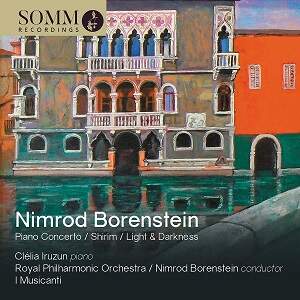
Nimrod Borenstein (b. 1969)
Piano Concerto Op. 91 (2021)
Light & Darkness Op. 80 (2018)
Shirim Op. 94 (2021)
Clélia Iruzun (piano)
I Musicanti
Royal Philharmonic Orchestra/Nimrod Borensteinrec. 2022, various locations
SOMM Recordings SOMMCD 281 [71]
Nimrod Borenstein was born in Tel Aviv, grew up in Paris, and in 1986 moved to London to pursue violin studies at the Royal College of Music. He has composed over 90 works, some of them recorded by an array of record companies (Presto Classical lists two monographic discs including this release, and nine other discs with his works, all in all on ten labels).
The shortest work here is the ten-minute piano quintet Light & Darkness. The composer manages to create the illusion of a larger ensemble. He says in the notes that he has tried to use limited resources at his disposal in a style where the piano accompanies the strings and vice-versa. The high, dreamy, magical and poetic sounds in the piano writing combine well with the warm sound of the strings, which sometimes play pizzicato, as though a group of guitars accompanying the piano. It is quite melancholy music, with a gradual build-up and release of tension. It begins and ends quietly, and is very pleasant to listen to.
Shirim is a thirty-three-minute collection of eighteen short piano pieces. The longest is a shade over three minutes, the shortest just a minute. The Hebrew word ‘shirim’ means either poems or songs. The work was a present for the children of close friends. It can be played as a complete collection, as a selection or individually. The composer writes that some of the pieces are easy enough for amateurs to play, and he thinks of them as his own songs without words; in fact, the third piece is Souvenirs de Mendelssohn. Naturally, he has varied the style between pieces, and says that in two of them he has tried to give the illusion that time has stopped. I am reminded of Prokofiev in the more driven pieces, and elsewhere of Debussy and Grieg. It may be that more devoted listening, piece by piece, will impress me with their memorability.
By far the most interesting and effective work here is the twenty-seven-minute Piano Concerto. Borenstein shows his talent for orchestration, and there is very vivid writing for percussion. The work begins like a grand romantic concerto, but I hasten to note that it does not adopt any old-fashioned presentational musical mores. The tempi, constantly changing, are accompanied by frequently introduced stylistic changes. For example, the piece briefly adopts a minimalist stance mid-movement, and the piano is interrupted by furious brass and outburst for the full orchestra. It is all very exciting. It must be incredibly difficult for the soloist to manage the interplay between piano and orchestra. Strangely enough, on my first hearing of the movement, I felt it to be chaotic, but I quite soon settled down to appreciate its ingenuity and quite individually stylised whole.
The central slow movement is a calm and reflective Adagio. To quote the composer, it is is “an oasis of calm after the flights of the first movement”. A poetic dreamscape, it is also needed in order to separate the first movement from the virtuosic third. The piano often plays precise, short notes, sometimes interrupted by brass fanfares and timpani, accompanied by lyrical strings.
The last and longest movement is the least interesting for me: highly virtuosic but without memorable themes. Once again, we have the regular tempo changes. Piercing brass and strings are made even more frenetic by occasional recurrences of themes from the first movement. The final pages, which test conductor, orchestra and soloist, are truly, exhaustingly frantic.
It is a pity that the disc does not have another orchestral or solo work in place of Shirim. I feel that its sheer length makes it an indigestible chunk. It might have better been replaced with Borenstein’s Piano Sonata.
The pianist and orchestra play superbly well, the recording is vivid, and Borenstein wrote fine, informative booklet notes. This disc will be attractive for anyone interested in his music.
Jim Westhead
Help us financially by purchasing from


I Musicanti Tamás András, violin, Robert Smissen, viola, Ursula Smith, cello, Leon Bosch, double bass – Light and Darkness)


















